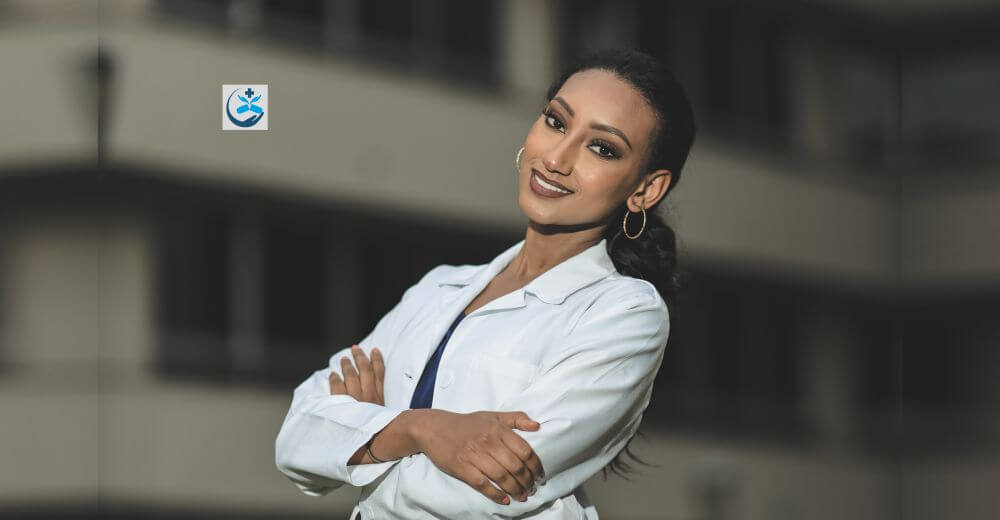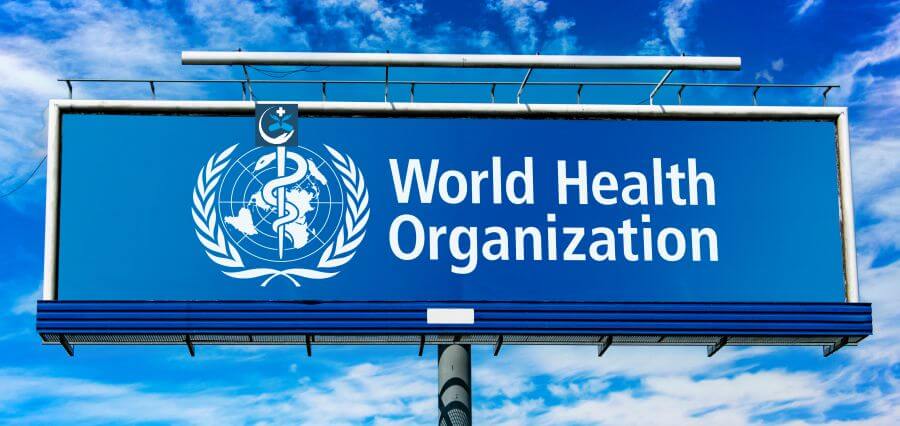“I am motivated by my desire to help my community,” states Misker Kassahun, “I believe we rise by lifting others.
She believes that real joy comes not from materialistic possessions but from helping others grow, and that’s where one’s life starts to have real meaning and value. Adding the vision of leading a purposeful life to her white coat, her leadership rightly accumulates the quality of spearheading a life of service; hence, the fruits of generosity have rubbed off through Misker’s Non-profit organization, GIV Society Ethiopia.
As the Co-founder and Executive Director of GIV Society Ethiopia, Misker is being empathetic towards the community, thus exemplifying the true meaning of “empowering society with healthcare.”
Misker’s aim is to strengthen the volunteerism culture while making a difference in combating social challenges. With GIV Society Ethiopia’s flagship project, she is facilitating a monthly free medical service campaign.
Under her leadership, the organization is accomplishing its mission using limited resources, especially when it comes to financing and managing human resources. Even though the organization’s staff is not remunerated and sustainable funding source, it still provides medical services to hundreds of community members in Addis Ababa free of charge.
We at Healthcare Everything were blown by her initiatives, and hence while searching for “10 Most Inspiring Healthcare Woman-Leaders to Watch 2022,” we crossed paths with Misker.
In order to know more about the dynamic persona that she is, kindly delve into her inspiring story.
How it All Started?
Misker has always been passionate about volunteering since a very young age. Her earliest volunteer experience was when she was 12, and she organized a small Christmas celebration event for her class. Since then, throughout elementary and secondary school, Misker has been fundraising and organizing events for different causes and organizations in her school. She also continued her fundraising efforts and volunteering services in medical school by organizing free medical care events. “I am an advocate of sharing what you have been given. I believe we rise by lifting others,” shares Misker.
As a co-founder of GIV Society Ethiopia, she was especially inspired by Mr. Karim Allibhai of GIV Society from Vancouver, Canada. He is the founder of the GIV society. In 2020, after she learned about the principles, strategies, and success of his non-profit in-depth, she decided to launch a similar organization in Ethiopia.
The Journey So Far
Misker believes that her journey in Co-founding and serving as an Executive Director is fascinating. Soon after completing medical school, she launched GIV Society Ethiopia. As a person who spent six years in medical school training in clinical skills, it was a tough for her to understand how the non-profit sector operates. From registration under the Authority for Civil Society Organization to recruiting volunteer team members, it was uncharted territory. Luckily, she had mentors, friends, and colleagues to guide her through. “My active leadership background in St. Paul’s Hospital Millennium Medical College helped me immensely in leading the NGO.” She further states, “SPHMMC is unique in that it invests in the soft skills of its students besides giving top-class clinical and medical skills.”
While elaborating on her journey, Misker shares that her journey in GIV Society Ethiopia is also greatly influenced by her willingness to learn from team members. She believes in a bilateral learning experience and makes herself available to learn from any situation.
Values to Believe In
GIV Society Ethiopia’s core belief is that community impact or helping others should not be limited to financial contributions. The organization works in a belief that one can share their time, expertise, network, and other intangible resources. In addition, it accepts that volunteers are an essential resource globally. “We are confident that most social problems can be alleviated if we can all contribute our share,” shares Misker. Another fundamental philosophy is that volunteerism or volunteers should be treated in a way that is a win for them as much as it is for the community. The organization believes its volunteers should be compensated for their work by learning new skills, making new networks, getting mentorship, professional certificates, and receiving stipends. Because of this, GIV Society Ethiopia ensures that volunteers and team members get the necessary compensation, especially in skills and professional development.
The mission of GIV Society Ethiopia is to bring positive social impact via volunteerism. They believe there is an untapped potential in Ethiopia, considering the predominantly young age of the population. Non-profit organizations such as GIV can contribute to the journey of becoming a middle-income country and alleviating the range of social problems affecting the country. The organization’s thematic area for 2021- 2025 is health and education. Because of this, it is currently invested in providing free medical services for underprivileged community members via volunteer health professionals. “We understand the gap in getting affordable and quality healthcare in Ethiopia, so we are working on providing these services,” adds Misker.
A Typical Campaign at GIV
What is unique about GIV Society Ethiopia is the range of services it provides. To paint a picture of what its medical services look like, Misker describes a typical medical service campaign. It looks like the following:
A volunteer will greet patients at the gate. They will be provided with personal protective equipment such as masks and sanitizer. They will then be escorted to a waiting area, where they will also be given health education. The health education is tailored to the age range of the patients its serves on a particular day. Common topics include Covid-19, Communicable diseases, kidney disease, hypertension, diabetes, family planning, and HIV/ AIDS. They will then be ushered to a vital sign area where nurses record heart rate, weight, blood pressure, and others. They will then be taken to the appropriate room according to their symptoms and age group. “We commonly have multiple male, female, and pediatric rooms where general practitioners and consultants are stationed,” asserts Misker. She further explains that they can also get to dental and ophthalmologic rooms, commonly crowded rooms. The organization also has a Pediatric Echocardiography room where children can be screened for heart diseases. Other independent rooms include HIV/AIDS counseling and testing rooms and family planning rooms, which provides a range of contraceptives for women.
After visiting their doctors, patients that need lab services will be sent to the Laboratory room, where the organization routinely provides urinalysis, stool examination, complete blood count, Covid testing, random blood sugar, and other tests. After going back to their doctors for results, they will head to the pharmacy room and get the medicine if they are prescribed medication. Suppose, through all this process, they cannot treat the patients, be it for lack of the proper equipment, the right specialist, or in an emergency case. In that case, patients will be referred to a tertiary hospital. The team member will give most patients appointments, and they will be put in contact with a social worker from the hospital.
“I would say that under my leadership, we have consistently brought in new volunteer team members who are passionate about their work and empathetic to the community they serve. I have also been able to recruit team heads and team members to open our new department, which is mental health advocacy. I truly understand the burden of mental illness and lack of awareness. Due to this, we now have a group working on providing training, panel discussions, and social media advocacy,” asserts Misker.
Under Misker’s leadership, she has been able to accomplish the organization’s mission using limited resources, especially when it comes to financing and human resource. Even though the organization has no paid staff and sustainable funding source, it still provides medical services to hundreds of community members in Addis Ababa free of charge.
Multi-talented Persona
The skills that helped Misker sustain GIV are mainly leadership and event planning. She believes she is an organized person with good planning skills. She makes sure the organization has a clear plan before they start executing an event. Her skills in written and in-person communication have helped her garner partnerships. The organization depends on in-kind donations, so she makes sure to foster relationships with different organizations. “I am also self-trained in digital marketing. For almost the first year of the NGO, I was responsible for all communication work, such as producing volunteer call-out posters, educational flyers, patient sheets, and associated publications, and handling the organization’s social media,” shares Misker.
Towards Bringing Change
GIV society aims to bring social change by working and providing volunteers a way to be part of the community impact. Besides being a non-profit organization, the team is also an event management team, so they are constantly planning and providing the community with free healthcare and health education services.
Intersections and Collaborations
What stands out to Misker is the multi-talented nature of young emerging leaders. The industry now relies on advanced technology, digital marketing tools, artificial intelligence, design thinking, and generally innovative solutions to respond to the ever-evolving need of clients/patients.
It has recently been a common trend to see young medical professionals be experts in health care and other unrelated fields but managed to find an intersection and collaboration for it. She has seen doctors who are skilled business owners, digital marketers, IT experts, and artificial intelligence enthusiasts. The standard/ traditional trend of staying in clinical medicine or maybe public health is now being challenged by many young and vibrant healthcare leaders and innovators.
Adversities on the Way
The biggest challenge, Misker believes, today is skilled fundraising ability. The complete shift in her professional journey after completing her medical degree has led to learning about many things from scratch. Although, during her stay at SPHMMC, she could develop soft skills such as leadership, event planning, fundraising, proposal writing, and advocacy, there still was a great deal to be learned. Although Misker was passionate about learning, leading, and working in a non-profit setting, it was challenging to keep up with all this new knowledge. She had to learn about the registration process of CSO, handling financial aspects, tax systems, reports and plan sub, mission, human resource management, sustainable fundraising and partnership, and other skills. It was overwhelming at times and frustrating as well for her.
Luckily the current Ethiopian civil society regulation is conducive to new NGOs and emerging leaders. She was privileged enough to have family, friends, colleagues, and mentors constantly advising and guiding her in leading GIV Society Ethiopia. The most important lesson she drew is never to give up; if you hold on enough, you will cross the mountain and enjoy the success. She has also learned the need to be open-minded and humble about learning.
Valuable Advice
While advising budding entrepreneurs, Misker states, “I would say, first and foremost, have a clear goal of what you would like to do. Extensive goal setting is more fruitful than having to figure out your journey as you go. In addition, knowing your “why” is very important. Ensure you clearly understand why you would like to work in a specific healthcare area. Ask yourself if you are willing to face unexpected challenges and how much you are ready to sacrifice. Asking if there is a need for your services and products is also an important question. No matter how passionate and organized you are, it will be a waste if you can’t take your skillset to the right community.”
Futuristic Approach
Misker would like to grow as an innovative and strategic leader in her professional career. She wants a better healthcare system for her community, seen in affordable and quality healthcare and expert health professionals. She is interested in becoming a contributor to a better healthcare policy, financing, and administration at different levels of healthcare facilities.
Her other area of interest in mental health advocacy; she plans to contribute to the campaigns to raise awareness, eliminate stigma toward people living with mental illnesses, and stringed mental health services in Ethiopia and hopefully in Africa.
Into the Spotlight
During her medical school stay in SPHMMC, Misker was able to represent her country Ethiopia in multiple international beauty contest. Her first title was ‘Miss Supranational Ethiopia 2016’ where she had the opportunity to represent Ethiopia in Poland among other 80 contestants from 80 different countries. She also holds the title of Miss University Africa 2017 Top 10 and Miss Universe Ethiopia 2017 1st runner up. She believes by balancing her modelling and medical career, she can inspire others to have a holistic approach to life. She also uses these platforms to advocate on causes she is passionate about such as mental health, women empowerment and volunteerism. Her last title was ‘Miss Africa Beauty Queen’ which she was able to win representing Ethiopia in 2018 in Lagos, Nigeria.
Next Story: https://healthcareeverything.com/sarah-spiekermeier-facilitating-a-health-experience/







